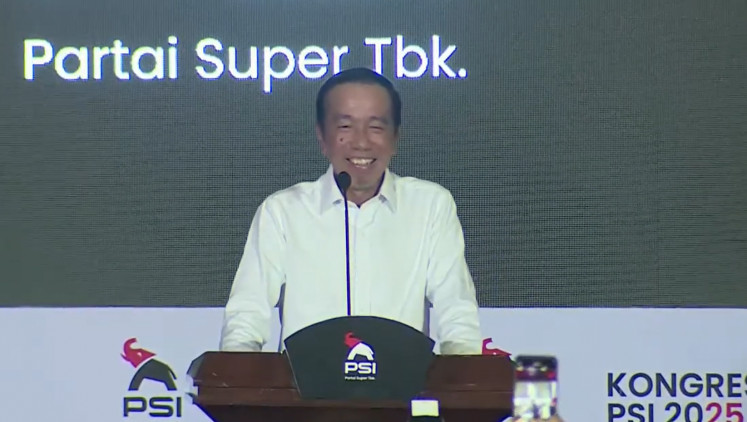Popular Reads
Top Results
Can't find what you're looking for?
View all search resultsPopular Reads
Top Results
Can't find what you're looking for?
View all search resultsCOVID-19 puts brakes on mass transit dream
Jakarta's commuters were over the moon when the capital's first subway opened in March 2019. A year later, they hardly enjoyed the transport system as the pandemic forced people to stay home.
Change text size
Gift Premium Articles
to Anyone
At the outset, 2020 appeared to be a promising year for the city-owned public transportation company, PT MRT Jakarta.
After its successful launch in March 2019, Indonesia’s first high-capacity public transit service quickly attracted the hearts of commuters in the capital city. It marked the manifestation of Jakartans’ long-awaited aspiration for a modern and reliable mass transportation as a partial answer to the city’s chaotic traffic, and MRT Jakarta had big projects and ambitious goals in mind for the year.
After nearly one year of operating its first line, which spans 15.7 kilometers between Lebak Bulus Station in South Jakarta and Bundaran HI (Hotel Indonesia traffic circle) Station in Central Jakarta, the company booked Rp 60 billion (US$4.22 million) in 2019 profits, although the government subsidy made up most of its income.
MRT Jakarta also recorded around 20 million passengers in less than a year, with an average daily ridership of 83,000 passengers.
With such a strong start, president director William Sabandar projected that MRT Jakarta would reach profits of Rp 200-250 billion in 2020. He also targeted an increase in daily ridership to at least 100,000 passengers.
The company had also planned further expansion of the service, with the construction of the second phase of development to break ground in early 2020. In this phase, MRT Jakarta’s North-South line was to be extended 6.3 kilometers from the Hotel Indonesia traffic circle to link the Kota Tua (Old Town) area in West Jakarta.
Unsurprisingly, however, the transit service has experienced several major setbacks since the coronavirus emerged in Indonesia in March, starting with a whopping 50 percent fall in average daily ridership from 88,000 passengers per day in February to only around 45,000 in March.
Daily ridership continued to plummet over April-May as the Jakarta administration started imposing the 14-day large-scale social restrictions (PSBB) on April 10 in an effort to curb the spread of the coronavirus.
The partial lockdown effectively restricted community mobility and public activities, which was reflected in the average daily ridership as the figure slumped 91 percent from March to 4,059 passengers per day in April. It fell again in May to 1,405 passengers per day, a 60 percent decrease and the lowest recorded ridership of the year.
City-owned transportation services Transjakarta and LRT Jakarta both experienced a similar fall in ridership as fewer people traveled during the PSBB.
The health crisis and attendant restrictions also resulted in a three-month postponement of MRT Jakarta’s second phase development project.
The first stage of the second phase development, or stage CP201, was originally scheduled to start in March to build a 2.8-kilometer tunnel from the Hotel Indonesia traffic circle to the National Monument (Monas) in Central Jakarta. Valued at Rp 4.5 trillion, the project was helmed by the Shimizu-Adhi Karya Joint Venture (SAJV) partnership between Japan’s Shimizu Corporation and state-owned construction company Adhi Karya.
Construction on stage CP201 finally commenced in June, after the Jakarta administration began relaxing certain restrictions on June 4.
The transit company met with an even bigger stumbling block in its other phase 2 development stages: the Harmoni-Sawah Besar-Mangga Besar extension, tunnel work and stations (CP202) and the stage 5 (CP205) project to develop railway systems and track work. Although the tenders for the two stages had been open for over a year, neither saw any proposals from potential bidders.
William attributed the exceptionally high technical complexity of these two stages for the absence of interest from potential bidders.
For example, the Harmoni and Mangga Besar stations were to be built 30 meters below ground, under the Batang Hari River. Meanwhile, the CP202 tunnel must pass many major facilities and must overcome the construction challenges of land subsidence and soft soil.
The planned route of the Harmoni-Mangga Besar tunnel also traverses the city’s famous Old Town area, the former administrative center of Dutch-ruled Batavia, which experts believe could hold a vast wealth of underground archeological finds. Contractors must therefore be wary of accidentally digging through or damaging priceless artifacts and structures that have yet to be discovered, and the special care required during the tunnel work could also mean further delays in completing the project.
The other package contracts for MRT Jakarta's phase 2 development projects are CP203 (Glodok to Kota, stations and tunnel work), CP206 (procurement of 42 rolling stock units) and CP207 (Automatic Fare Collection/AFC system). The projects were originally planned to be developed simultaneously.
The combined value of the phase 2 package contracts is Rp 22.5 trillion. The projects are funded by the Japan International Cooperation Agency (JICA), so only Japanese companies are eligible to bid as the package lead for each stage.
William said that MRT Jakarta was currently working with JICA on directly appointing a construction company to tackle the CP202 and CP205 stages.
"We consulted JICA after we failed [to receive any proposals] in two separate bidding processes, and [we have] agreed to directly appoint a Japanese construction firm to handle the projects. The process will start early next year," he told The Jakarta Post on Friday.
The operation of the HI-Harmoni and the Glodok-Kota sections were originally to be respectively launched at the end of 2024 and 2025, but William said that the schedule would be pushed back to 2025 and to 2027 due to the setbacks.
Despite these obstacles and the unforeseen health crisis, 2020 was not all bleak for MRT Jakarta, and the company still aims to go full steam ahead toward creating new innovations to stay afloat amid the current fall in income.
The company’s communications head, Ahmad Pratomo, said MRT Jakarta had this year adopted the new "beyond normal" business model that capitalizes on non-farebox revenue streams.
"Through the new business model, we created several innovations while maximizing our existing non-farebox business," Ahmad told the Post on Friday.
For example, MRT Jakarta had turned many pillars of its elevated stations and other external spaces into advertising spaces.
"We also used our website, social media [accounts] and mobile application for advertising and other commercial purposes," he added.
The empty spaces inside the stations had been turned into coworking spaces fitted with various facilities like video conferencing equipment. The MRT stations have also started accommodating vending machines and smart lockers.
Meanwhile, MRT Jakarta is planning to develop an online training course for small and medium enterprises (SMEs) and startups, Ahmad said. Another plan was to open a rail delivery service for documents and cargo.
At the same time, the company was also doubling down on its transit-oriented development (TOD) business, or smart transit hub, an urban development concept that integrates residential, commercial and leisure facilities within walking distance of public transportation.
With the potential rollout of a mass vaccination program in the year to come, Jakarta’s commuters might be able to revive their aspirations for the capital’s mass transit system in 2021.










